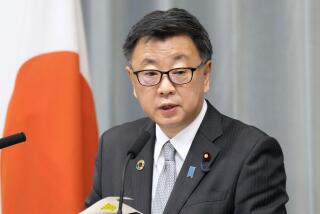Japanese Foreign Minister Cancels Visit to U.S.
- Share via
TOKYO — Foreign Minister Tadashi Kuranari on Wednesday called off a trip to Washington because of opposition protests over a proposed new Japanese sales tax.
Earlier in the day, Kuranari had told reporters that the U.S. Congress should realize that getting emotional about America’s trade deficit with Japan “won’t do anybody any good” and that the two governments “should deal with the issue in a calm manner.”
Kuranari had planned to leave today for the United States, where Congress will soon begin considering measures aimed at reducing the U.S. trade deficit, but a Foreign Ministry spokesman said the visit has been called off because of the uncertainty in Parliament.
The spokesman said Kuranari still wants to make the trip, and as soon as possible, but has no plans at present to do so.
Schedule Uncertain
Kuranari would have been leaving the country in the midst of parliamentary debate over the fiscal 1987 budget. Public hearings had been scheduled for Friday and Saturday, and Cabinet ministers are not required to be on hand for these, but a boycott by opposition parties has thrown Parliament’s schedule up in the air.
Kuranari’s presence in Parliament, along with that of other ministers, will be required when debate on the budget is resumed. Kuranari told the reporters that he could not predict when this might be.
His scheduling a visit to Washington underscored increasing Japanese concern over what Kuranari called “the many protectionist provisions” in bills that have been introduced in Congress.
He said he wanted to correct a misunderstanding that Congress and other U.S. officials have “that Japan is doing nothing” to reduce its burgeoning trade surplus. Japan’s global trade surplus reached a record $92.7 billion last year, as calculated by the International Monetary Fund. The surplus with the United States was $58.6 billion.
Painful Restructuring
Yet Japan, Kuranari said, is carrying out a painful restructuring of its economy in an effort to promote imports. This is reflected, he said, in announcements by steel, shipbuilding and coal-mining firms of reduction of their labor forces.
“Japan will do what it should, and so should America,” he said, calling on the United States to reduce its budget deficit and “strengthen competitiveness.”
Asked if he were prepared to declare that Japan’s surplus with the United States would decline this year, the foreign minister avoided a direct answer. Instead, he pointed to declines of 15.9% in the yen value of Japan’s global exports and an increase of 12.5% in the volume of Japan’s imports last year.
He said these figures represent a trend in Japan’s global trade and in its bilateral transactions with the United States.
The Finance Ministry reported Tuesday that global exports increased by 14.3% in February, while imports declined by 9.4%, giving Japan a $7.1-billion trade surplus for the month. It was Japan’s ninth-largest monthly trade surplus to date.
Imports Up by 11.5%
Japan’s exports to the United States in February increased by 8.5%, while imports of American goods rose by 11.5%.
The February statistics also show that the rate of increase in Japan’s exports of semiconductors to Taiwan, Korea and Southeast Asia exceeded the gain in overall chip exports for the eighth month in a row. February exports to this region, where U.S. officials have charged that Japanese makers are dumping their products below cost, nearly doubled, to $139 million, while overall exports rose by 59.1%. In January, chip exports to the region rose by 72.5%, compared with 46.5% overall.
Dumping Charge Denied
The Ministry of International Trade and Industry denies the dumping charge, but in mid-February it ordered Japanese firms to reduce production by 20%. Ministry officials said the results of this action are expected to be reflected in trade figures for March.
More to Read
Sign up for Essential California
The most important California stories and recommendations in your inbox every morning.
You may occasionally receive promotional content from the Los Angeles Times.












